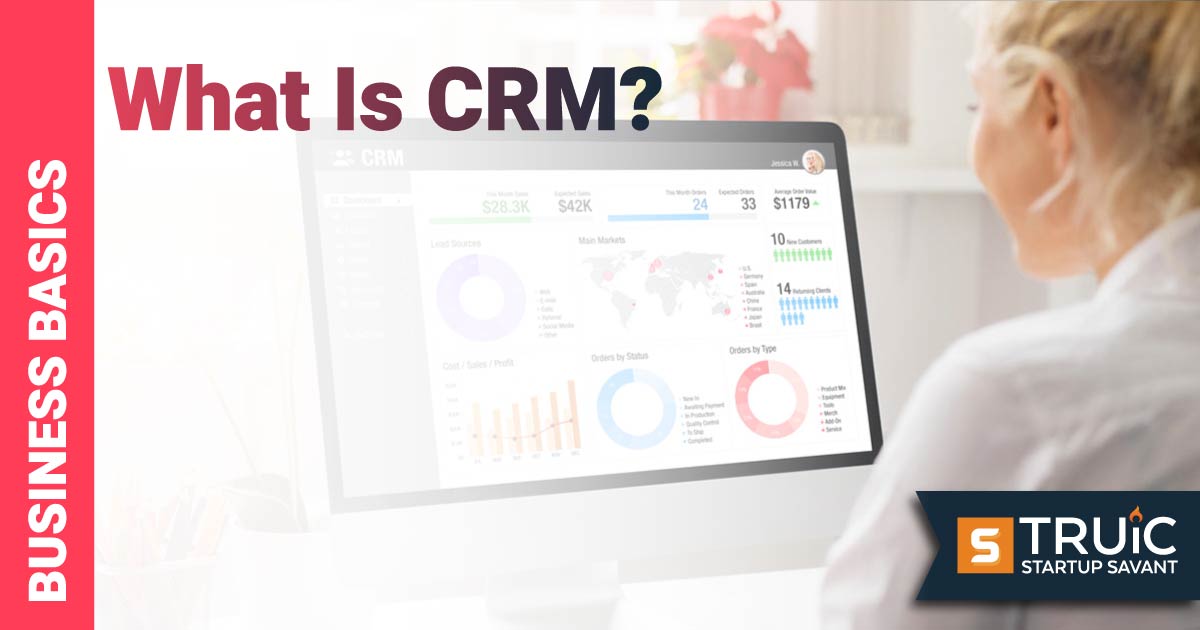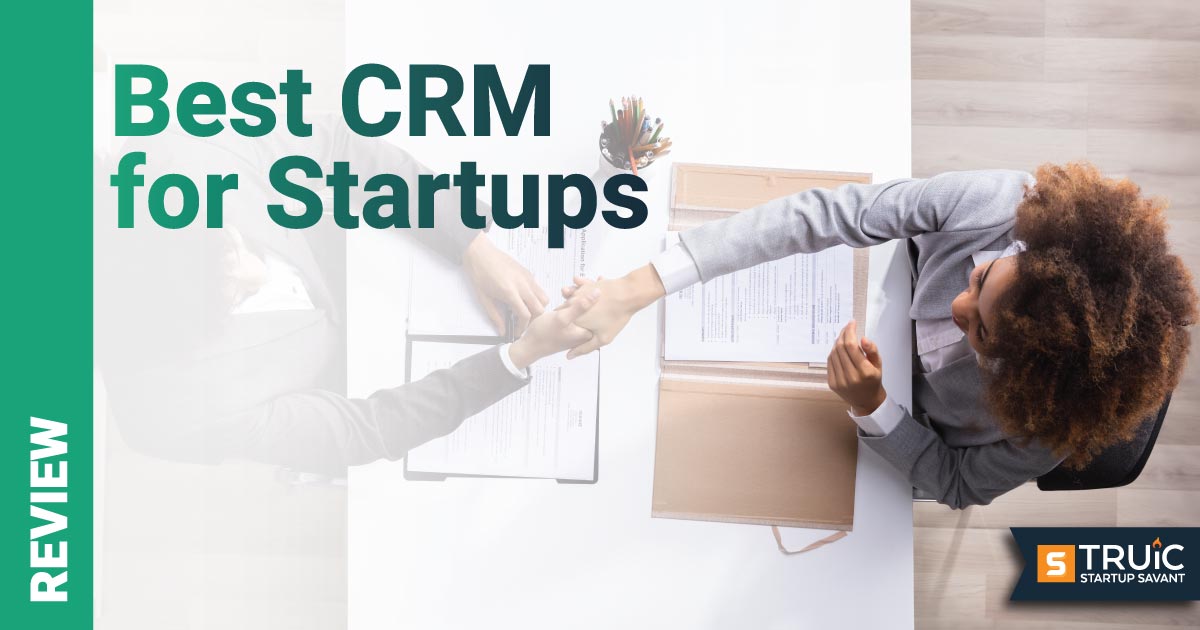Agile CRM Review 2024
Is It the Best CRM Software?

Last Updated: By TRUiC Team
A customer relationship management (CRM) software program is an essential tool for many organizations. It enables the efficient management of customer connections and interactions, helping to improve relationships and build sales. Agile CRM is one of the best CRM software products on the market, allowing for customer retention, sales, and marketing automation, as well as a simple-to-use drag-and-drop platform.
For startups or small businesses looking for a robust solution, this Agile CRM review will shed light on what you can expect.
Recommended: Check out our review of the best CRM for startups.
Pros and Cons of Agile CRM
Agile CRM provides a cloud-based software solution designed for small- to mid-size companies that are looking for efficient ways to manage appointment scheduling, contact management, automation in marketing, and overall solid communications tools.
Take a look at some of the ways Agile CRM stands out.
Pros of Agile CRM Software
- Affordability
- Quality email marketing
- Automated sales pipeline
Cons of Agile CRM Software
- Not a lot of reporting options
- Few third-party integrations
Agile CRM Pricing and Features
Pricing is always a big factor when it comes to the implementation of CRMs. Most companies see the value of these platforms but also have to pay per user or a set amount each year, which can be expensive. Agile CRM offers a free version as well as an Enterprise option and two others in between. Compared to other products, Agile CRM is competitively priced and tends to be quite affordable overall.
Free ($0)
Notable Features:
- Unlimited deals
- Email tracking
- Appointment scheduling
- Available custom data fields
- Up to 1,000 contacts and companies available
Starter ($8.99+/User/Month)
Notable Features:
- Up to 10,000 contacts and companies
- 2 way email integration
- Social monitoring
- Landing page builder available
- 10 nodes per campaign
Regular ($29.99+/User/Month)
Notable Features:
- Up to 50,000 contacts and companies
- Appointment scheduling
- Custom deal tracking
- Mobile marketing
- 25 nodes per campaign
Enterprise ($47.99+/User/Month)
Notable Features:
- Unlimited contacts and companies
- Call recording
- Automated voicemails
- Dedicated accounting recap
- Available onboarding coach
Agile CRM Reviews
A product designed for small to mid-size companies, Agile CRM, is a well-recognized solution that is applicable to many industries and sales functions. Users seem to enjoy the functionality and find no trouble learning how to use it. It is also quite efficient and easy to set up to start using. In many ways, it is a robust solution.
Here are some verified reviews from TrustRadius by people who used Agile CRM:
“We are using Agile CRM to streamline our Support, Sales, and development process. The robust features have reduced a lot of time for our team in completing the daily tasks. They have all the required features which every startup or big organisation required to run their smooth operation. Overall it's a budget friend solution with great UI and easy to set up.”
“If you want a highly customizable system, this may not be perfect for you. If you want an extremely easy to use and setup system, Agile CRM is perfect. it's incredibly easy to get a team up and running in only a few hours. I set up my system, a campaign, my users, added custom fields, designed a couple of email templates all in one afternoon.”
“Agile CRM was developed the the company's own business model. So its very well suited to a SAAS model. And many business models products or services to individual users rather many contacts within the same organization, would find the suite of functions attractive. If you develop or manage your own website, and have some level of expertise in online marketing, then you should be able to get to grips with some powerful marketing automation functions in Agile CRM. After a year or so, I concluded Agile wasn't a perfect fit for my small B2B business. I eventually moved to Active Campaign which while being more of a marketing tool than a CRM, actually turned out to be the perfect CRM for my business.”
Those using Agile CRM have a lot of positive things to stay about it, including its detailed statistics and analytics tools. It also offers an overall level of functionality that tends to stand out from the competition – it is designed to just about do it all. It incorporates project management and automation well, though some report that it needs a bit more from its features. Others note that it can be hard to learn how to use the automation tools, which limits their overall application of them.
Some people do report issues with functionality or limited access to features. Most have a positive experience with customer service, though, when reaching out to overcome these challenges through troubleshooting. This tends to be the case with the higher-end packages offered.
For those who are looking for the overall functionality of a CRM that is swift and streamlined, Agile CRM does well. Users note that it has a simple and efficient marketing setup, and adding in contacts and managing them does not take much time. It also has a lot of flexibility to allow for customizations, including various fields and templates. They tend to report positive experiences with the automation features such as form-filling and task management.
How Does Agile CRM Compare?
There are plenty of competitors out there that offer CRM software for startups. One of the more popular is HubSpot. We find that Agile compares to HubSpot in the following ways:
Pricing
When it comes to pricing, both HubSpot and Agile offer free intro packages. You will find that HubSpot’s higher-end packages, though, are far more expensive than what you can expect from Agile. The company’s Starter package is $50/month for two users compared to Agile’s much lower cost. The Sales Hub Enterprise package is the most expensive out there at $1,200/month for 10 users.
You will likely get a bit more bang for your buck with Agile, but it may not offer all of the features that you want and can expect from HubSpot. For those who need a more robust solution, and have a larger number of users, going with HubSpot makes sense. For startups and those who may not be ready to commit to a higher-end package, Agile is a strong option, especially with its higher-end starter package.
Features
Both platforms offer a lot of key features, which is what makes them so effective for customer service relationship management. There are few features, though, that Agile offers that HubSpot does not, and that means HubSpot tends to be the favored option for those who are looking for the best accessible. A few areas where Agile stands out include its customer contract management tools, campaign management features, and case management features. It tends to offer a lot of depth in its contact and account management to meet the needs of most organizations.
By comparison, HubSpot offers just as many features and tends to stand out with higher positive user reviews in a few key areas. That includes contact and account management, task and activity management, and desktop integration. It also does well in its customer contract management, quoting tools, and email marketing.
Ease of Use
Overall, Agile is not hard to set up or learn to use, though it has some features that tend to require a bit more training and insight. Specifically, some users find that the automation features are a bit more complex to apply to their efforts, making it a bit harder to get the most out of them. Agile’s platform is designed to be fairly easy to use otherwise, with drag-and-drop features to create customized solutions and reports. It is not difficult to use overall.
HubSpot may be easier to use, though. Users tend to find that it is more of the expected format and easier to learn quickly. They also offer more support during the onboarding and initial use, which could help to minimize concerns later. The platform is easy enough to navigate with dashboards that provide clear steps to take, easy access to tools, and a range of features. HubSpot tends to stand out regarding ease of use, but that doesn’t mean Agile is inefficient or difficult.
Integrations
Agile CRM integrations are as robust as HubSpot. That says a lot because HubSpot is noted for its huge number of integration features and options. Both work with Shopify, Salesforce, Stripe, Twitter, Gmail, Zapier, Google, and much more. For those who need integrations to software programs they are already using, it is rather easy to find solutions on both platforms.
Customization
Customizations are a big part of the process of using a CRM, and both products do well in this area. Customizations for email, templates, dashboards, and contract management are all excellent with Agile.
When it comes to HubSpot, there are a lot of details to consider here. The platform offers the most flexible of options when it comes to customization and offers a range of tools to meet your needs, no matter the industry or the type of outreach you are doing.
Reporting and Analytics
Another core area that both Agile and HubSpot do well is reporting and analytics. Agile allows for some excellent comparison tools and data visualization features, which help to bring reports to life. Also beneficial is the vast amount of data available to create those reports.
As a business owner, HubSpot is going to make reporting very efficient and beneficial with numerous tools to help with the management of the system. Beyond a doubt, HubSpot offers just about everything needed, though Agile tends to be a bit easier to use when creating customized reports.
Customer Support
For customer service, you can expect a wide range of results when looking at reviews. Most people find that Agile does a good job, providing a solid number of ways to communicate with the sales teams, such as over the phone, email, and through a help desk. It is available 24 hours a day, which is often very important for companies that are looking for a system they can rely on around the clock.
However, HubSpot is known for its highly efficient customer service. Its platform is more robust, with more educational features and tools built into it, including a variety of solutions to help teams learn how to use the automation features, marketing tools, customizations, and features overall. It tends to be easier to use as well (including with a simpler setup process). The customer service is friendly and reliable, often available quickly.
Agile:
Pricing starts at: Free
In Business Since: 2013
Perfect for: Small- to medium-sized businesses that need a central hub for their sales teams.
HubSpot:
Pricing starts at: $0
In Business Since: 2006
Perfect for: Businesses looking for ways to manage their relationships with customers easily.
Final Thoughts on Agile CRM
Agile is a highly competitive CRM product. Without a doubt, it is an excellent choice for those who are looking for a more robust solution that tends to be far more affordable. Other products offer more, but Agile stands out for its affordability and sizable offerings, including numerous features. Without a doubt, Agile CRM is an excellent solution for most needs.
Frequently Asked Questions
What is Agile CRM?
Agile CRM offers sales and marketing automation options for small- and mid-sized businesses through its CRM platform. It has options available to meet all of its customer's needs.
Is Agile CRM any good?
Agile CRM offers a wide variety of options and customizations based on the package chosen. They work as a central hub to manage all CRM needs to keep your sales team running efficiently.
What CRM is better than Agile?
HubSpot may be a better option than Agile since it does offer businesses of all sizes a free platform to use as opposed to only a limited number of users.


